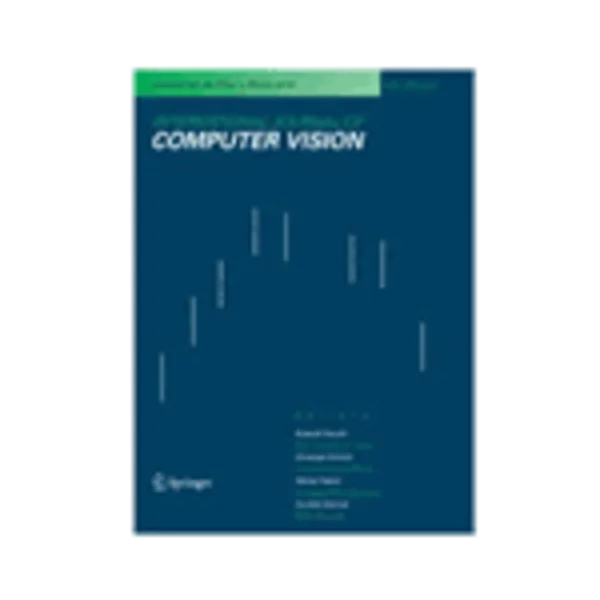-
self-calibration under the cayley framework
جزئیات بیشتر مقاله- تاریخ ارائه: 1392/07/24
- تاریخ انتشار در تی پی بین: 1392/07/24
- تعداد بازدید: 1073
- تعداد پرسش و پاسخ ها: 0
- شماره تماس دبیرخانه رویداد: -
the cayley framework here is meant to tackle the vision problems under the infinite cayley transformation (ict), its main advantage lies in its numerical stability. in this work, the stratified self-calibration under the cayley framework is investigated. it is well known that the main difficulty of the stratified self-calibration in multiple view geometry is to upgrade a projective reconstruction to an affine one, in other words, to estimate the unknown 3-vector of the plane at infinity, called the normal vector. to our knowledge, without any prior knowledge about the scene or the camera motion, the only available constraint on a moving camera with constant intrinsic parameters is the well-known modulus constraint in the literature. do other kinds of constraints exist? if yes, what they are? how could they be used? in this work, such questions will be systematically investigated under the cayley framework. our key contributions include: 1. the original projective expression of the ict is simplified and a new projective expression is derived to make the upgrade easier from a projective reconstruction to a metric reconstruction. 2. the constraints on the normal vector are systematically investigated. for two views, two constraints on the normal vector are derived; one of them is the well-known modulus constraint, while the other is a new inequality constraint. there are only these two constraints for two views. for three views, besides the constraints for two views, two groups of new constraints are derived and each of them contains three constraints. in other words, there are 12 constraints in total for three views. 3. based on our projective expression and these constraints, a stratified cayley algorithm and a total cayley algorithm are proposed for the metric reconstruction from images. it is experimentally shown that they both improve significantly the numerical stability of the classical algorithms. compared with the global optimal algorithm under the infinite homography framework, the cayley algorithms have comparable calibration accuracy, but substantially reduce the computational load.
مقالات جدیدترین رویدادها
-
استفاده از تحلیل اهمیت-عملکرد در ارائه الگوی مدیریت خلاقیت سازمانی و ارائه راهکار جهت بهبود
-
بررسی تاثیر ارزش وجوه نقد مازاد بر ساختار سرمایه شرکت های پذیرفته شده در بورس اوراق بهادار تهران
-
بررسی تأثیر سطح افشای ریسک بر قرارداد بدهی شرکت های پذیرفته شده در بورس اوراق بهادار تهران
-
بررسی تأثیر رتبه بندی اعتباری مبتنی بر مدل امتیاز بازار نوظهور بر نقد شوندگی سهام با تأکید بر خصوصی سازی شرکت ها
-
تأثیر آمیخته بازاریابی پوشاک ایرانی بر تصویر ذهنی مشتری پوشاک ایرانی (هاکوپیان)
-
ارزیابی امکانات و محدودیتهای توسعه فیزیکی و ابعاد هویت کالبدی شهر بیرجند به منظور جهات بهینه و توسعه آتی
-
تاثیر محلول پاشی عناصر منگنز و آهن بر عملکرد و اجزای عملکرد کمی و کیفی ارقام آفتابگردان
-
بهینه سازی شرایط عملکردی در تبدیل یک موتور اشتعال جرقه ای بنزین سوز به گازسوز
-
improvement of seismic control of cable - stayed bridge using simultaneous analysis of cost and loss
-
microcrystallization of lactose during droplet drying and its effect on the property of the dried particle
مقالات جدیدترین ژورنال ها
-
مدیریت و بررسی افسردگی دانش آموزان دختر مقطع متوسطه دوم در دروان کرونا در شهرستان دزفول
-
مدیریت و بررسی خرد سیاسی در اندیشه ی فردوسی در ادب ایران
-
واکاوی و مدیریت توصیفی قلمدان(جاکلیدی)ضریح در موزه آستان قدس رضوی
-
بررسی تاثیر خلاقیت، دانش و انگیزه کارکنان بر پیشنهادات نوآورانه کارکنان ( مورد مطالعه: هتل های 3 و 4 ستاره استان کرمان)
-
بررسی تاثیر کیفیت سیستم های اطلاعاتی بر تصمیم گیری موفق در شرکتهای تولیدی استان اصفهان (مورد مطالعه: مدیران شرکتهای تولیدی استان اصفهان)
-
مهارت های ضروری مدیران سازمان های آموزشی با مداقه در شاخص های روابط انسانی مطلوب در محیط آموزشی
-
مسئولیت مدنی سبب مجمل در حقوق مدنی ایران و فقه امامیه
-
تاثیر تمرین nasm و عصبی عضلانی بر حس عمقی مچ پا، تعادل، قدرت بازیکنان فوتبالیست مرد مبتلابه پیچخوردگی عملکردی مچ پا
-
تاثیر تحریم های اقتصادی بر عملکرد سازمانی
-
drought scenario analysis using riverware: a case study in urumqi river basin, china




سوال خود را در مورد این مقاله مطرح نمایید :